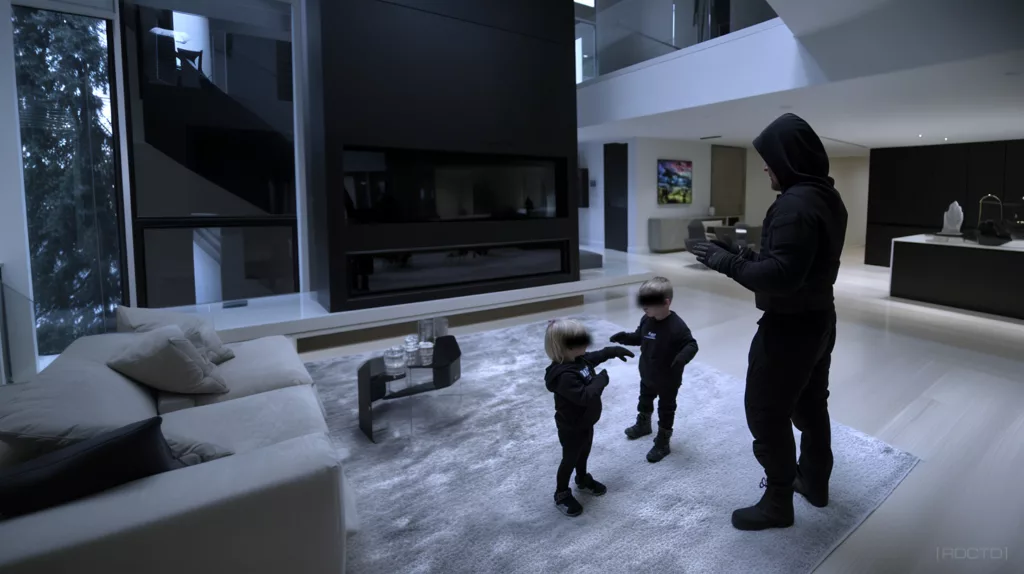Managing Your Children Like They’re CIA Assets
You want to raise smart, resilient, mission-ready humans that you can control? Treating your kids like they’re CIA assets may help.
The strongest kids aren’t the ones kept safe, they’re the ones taught how to move when things go sideways. Your job isn’t to protect them from the world, it’s to teach them how to operate inside it so they can that themselves.
Raising kids? It’s not that different from running an op behind enemy lines. You’re dealing with unpredictable behavior, constantly shifting intel (thanks to their moods), and the need for 24/7 situational awareness. But here’s the kicker: the principles we use in the field to manage assets work just as well in the backyard as they do in Baghdad.
Build Trust Like a Handler
In tradecraft, trust is your currency. If your asset doesn’t believe in you, it doesn’t matter how clean your cover is or how slick your plan looks, the op collapses. Kids operate on the same principle. If they don’t trust that you’ve got their back, they won’t follow your lead when it matters. And trust isn’t built with empty threats or power plays, it’s built through presence, consistency, and proof over time.
You’ve gotta be their constant. Life’s already full of unknowns: school drama, hormonal chaos, bad intel from peers, and pressure they won’t always talk about. You? You’re the anchor. But here’s the trick, you’re not just managing behavior. You’re cultivating long-term influence. That means putting in the reps, even when the mission’s messy.
Use tradecraft. Be observant, calm, and calculated. And don’t ever bluff, because once you lose your credibility, you’re not the handler anymore… you’re just another noise in their comms channel.
How to build that trust on the daily:
• Show up without conditions. Don’t be the parent who’s only around when there’s a problem. Be present during the boring stuff. It signals loyalty and that matters more than discipline in the long run.
• Stay consistent under pressure. Whether you’re running late, dealing with a crisis, or they just pushed your last button, don’t flip. Stability in chaos is what makes a handler effective.
• Reward honesty, not perfection. If they mess up but come clean, that’s a win. Teach them that trust is more valuable than being “right.”
Trust isn’t built overnight. It’s fieldwork. It’s a slow, steady accumulation of moments where you prove you’re not going to burn them when things go sideways. Do that enough times, and you won’t need to force obedience, they’ll choose loyalty.
Establish Clear Mission Parameters
Assets operate better when they understand their mission. Kids are no different. Set expectations like mission objectives; clean, tight, and with zero wiggle room for interpretation. “Clean your room” is vague. “Make the bed, put toys in the bin, and laundry in the hamper before 1900 hours” is actionable. The clearer the task, the less drama on the back end.
In the field, we don’t hand an asset a vague briefing and hope they “figure it out.” We give them the who, what, where, and why. Kids need the same. They function better with boundaries, clarity, and purpose. Otherwise, they’ll test the perimeter until they find a weak spot, and they will find it.
Give them structure, but don’t drown them in it. You’re not building robots – you’re training operatives who think, react, and adapt. Just make sure the framework’s solid enough to support the mission.
Tactical rules for giving orders that stick:
• Be specific – Replace “behave at dinner” with “no yelling, no phones at the table, and say thank you when you’re served.”
• Define consequences in advance – Never threaten in the heat of battle. Say, “If X happens, Y follows” before things go sideways.
• Stick to timeframes – Kids respond to deadlines. Add a countdown clock to the mission. It works. Always has.
Setting mission parameters doesn’t mean you’re running a boot camp. It means you’re handing your kid the playbook before kickoff. Ambiguity leads to chaos. Clear orders create accountability. They learn to own their part and that’s how you raise someone who’ll never freeze under fire.
Use Surveillance, Not Micromanagement
We don’t tail assets every minute of the day. That kind of heat burns an operation fast. Instead, we use surveillance; quiet, subtle, and always watching the patterns. Same goes for your kids. They need space to operate, screw up, and self-correct. If you hover, you don’t build decision-makers, you build operatives who freeze without command.
Surveillance isn’t about invading privacy. It’s about passive awareness. Eyes on the environment, ears tuned to the tone shift, and knowing when something’s off without needing a confession. You don’t need to break into their diary, you just need to know what’s normal so you can spot abnormal fast.
How to run surveillance without becoming a control freak:
• Set Tripwires, Not Traps – Put soft checkpoints in place: check-ins after school, open phone policies, family dinners. If they go dark, you’ve got a signal that something’s wrong.
• Use HUMINT (Human Intelligence) – Know their friends, teachers, and mentors. Those are your sources. Keep them talking, and you’ll catch early signs of instability before it becomes a crisis.
• Control the AO (Area of Operations) – Your house, your rules. No phones behind closed doors. No sketchy apps. You don’t need a wiretap, you just need boundaries that funnel activity into the open.
Your mission isn’t to track every move, it’s to shape an environment where you don’t have to. Surveillance works best when they know you’re watching but don’t know how much. That ambiguity keeps behavior clean without breaking trust.
So don’t micromanage. Manage the terrain, monitor the patterns, and trust the training you’ve given them. When they go off-script, you’ll know, and you’ll be ready.

Control the Narrative
In covert ops, perception is power. You don’t wait for your adversaries to define the story – you get ahead of it, shape the messaging, and lock in the frame. Same thing at home. Your kid’s worldview is getting hit from every direction: social media, classmates, YouTube algorithms, school gossip. If you’re not controlling the narrative, someone else is, and odds are, they don’t have your kid’s best interest in mind.
You’ve gotta be the first and loudest voice they trust. That means talking early and often, even when the topics are uncomfortable. Weapons-grade parenting involves handling sensitive material with calm, precise delivery, no panic, no shame. You’re not pushing propaganda; you’re supplying raw intel in a format they can process.
How to lock in that frame before external noise takes over:
• Preempt the Static: Don’t wait for the school to bring up sex, drugs, or politics. Hit those topics head-on with calm, factual, no-BS conversations. If they hear it from you first, they’ll weigh everything else against your truth.
• Adjust for Age, Not Truth: Water down delivery, not reality. Kids can handle more than you think when the message is right-sized. You’re shaping future operators, not keeping them in the dark.
• Never Mock Their Sources: If they trust a bad source, don’t ridicule it. Interrogate the intel with them. Show them how to analyze, question, and think tactically. Mockery builds walls, dialogue opens doors.
The mission here is long-term influence. You’re not trying to win every conversation. You’re building a mental playbook in their heads, a lens they’ll use to process all future info. That kind of groundwork keeps them from getting manipulated, misled, or recruited by dumb ideas. Control the narrative, and you control the op. Let it slip, and you’re in cleanup mode.
Debrief After Every Operation
Whether it’s a bad day at school, a blown test, or your kid getting into it with a sibling, don’t just sweep it under the rug and call it a night. Sit them down. Strip away the noise. Talk through what happened, how they felt, what triggered the situation, and what they could’ve done differently. That’s a debrief. And it’s one of the most underrated tools in the parenting arsenal.
You’re not there to punish, you’re there to gather intel and develop strategy. Kids don’t learn from lectures; they learn from connecting the dots between action and consequence. Give them a safe space to be honest, but don’t let them dodge accountability. A proper debrief should always be clean, brief, and tactical. Keep it calm, keep it cool, and always wrap it up with lessons learned.
What to focus on mid-debrief:
• Facts first. Don’t let emotion hijack the session. Get the raw sequence of events before diving into feelings. Truth lives in the timeline.
• Feelings matter, but don’t overplay them. Acknowledge their emotions, but don’t let those emotions rewrite reality.
• Extract a lesson. Every debrief should end with a takeaway. “Next time, what do you do differently?” If there’s no lesson, there’s no progress.
Debriefing teaches them one of the most critical pieces of tradecraft: self-awareness under stress. You’re building their ability to process mistakes, pivot, and improve. That’s how you turn chaos into competence. You’re not raising someone who’s always right, you’re raising someone who knows how to adjust when they’re wrong.
And let’s be real: that’s how you build an asset worth running.
Train for Resilience, Not Comfort
We don’t prep assets by coddling them in safehouses with silk sheets and soft lighting. We put them through the grinder, controlled environments that simulate chaos so they know how to function when the real thing hits. Your kid doesn’t need a padded existence. They need friction. Discomfort. The chance to face hard things with you watching, not shielding. That’s how you build resilience, exposure with support, not insulation from reality.
Start small. Let ‘em sweat a little in the safe zones before they hit the red zones. They’ll screw up. That’s part of the op. You’re not raising someone who avoids danger – you’re raising someone who can assess risk, act under pressure, and adapt when the mission goes off-script.
Some quick-field tradecraft you can use right at home:
• Give them real responsibility. Not chore charts with stickers, actual responsibilities with consequences. A little pressure teaches accountability. No one’s coming to backstop them every time.
• Let them handle failure without rescue. Step in only if the damage is mission-ending. Otherwise, let them feel the hit. Then talk it through after. That’s a live-fire learning moment.
• Set time limits, not outcomes. Tell them when to have something done, not how. Let them figure out the method. Autonomy breeds confidence, and sharp problem-solving skills.
Resilient kids don’t need perfect conditions. They need imperfect ones, where they get knocked around a little, get back up, and know you’ve got their six if things go truly sideways. You’re not preparing them for Disneyland. You’re preparing them for the field – where plans fail, people lie, and strength comes from the ability to think, pivot, and survive.
Because when the real op begins (life, relationships, crisis) you won’t be there to call in an extraction. So train now. While it still matters.
Keep Your Own Cover Tight
Kids are walking lie detectors with zero filter and scary-good pattern recognition. You think you’re being slick? Think again. If your words don’t match your actions, your credibility’s shot, and once they stop believing you, good luck getting any real buy-in. Just like with assets, if your cover’s weak, the op’s compromised. You’ve got to be the same person in public, in private, and in pressure. Don’t fake discipline, don’t fake integrity, and never fake love.
You don’t have to be perfect, but you do have to be consistent. That’s what earns respect. And in parenting, respect beats fear every time.
How to keep your cover from getting blown:
• Lock in your routines. Operatives run on structure. Same applies here. If you say bedtime’s 8, don’t make it negotiable just because you’re tired. Predictability builds trust.
• Own your mistakes. If you screw up, admit it. It doesn’t make you look weak, it makes you look real. Kids respect truth over bravado.
• Don’t preach what you don’t practice. You can’t lecture them about honesty while cutting corners yourself. They’ll model your behavior, not your words.
At the end of the day, you’re the template. They’re scanning you for how to move through the world, especially under stress. If your personal cover’s sloppy, you’re not just undermining your authority – you’re teaching them how to lie to themselves.
So stay tight. Operate clean. Lead like someone worth following.
You’re not running a dictatorship, and this ain’t Langley HQ. But if you approach parenting with a little operational discipline, a bit of tradecraft, and the mindset of an operative managing high-value assets, you’ll raise kids who are sharp, self-reliant, and ready for whatever mission life throws at them.








